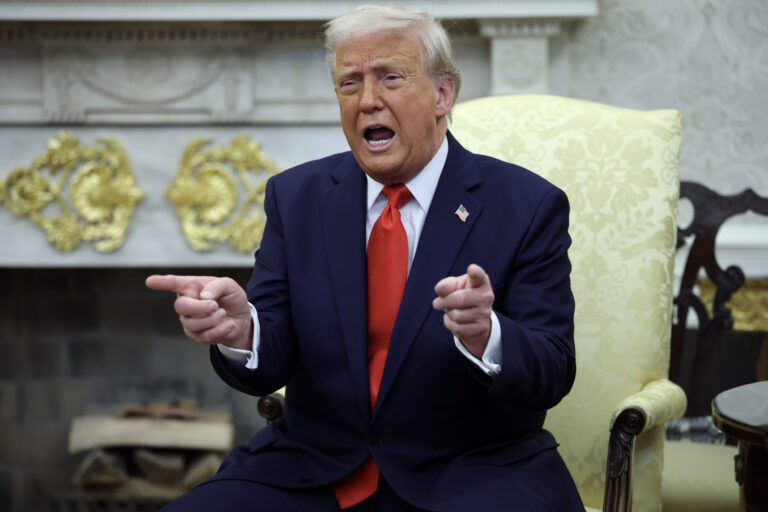President Donald Trump appeared to lash out at U.S. Supreme Court rulings requiring his administration to pursue its mass deportations on a case-by-case basis through the courts.
“How can Biden let Millions of Criminals into our Country, totally unchecked and unvetted, with no Legal authority to do so, yet I, in order to make up for this assault to our Nation, am expected to go through a lengthy Legal process, separately, for each and every Criminal Alien,” Trump wrote in a post on Truth Social on Monday.
Last month, Trump’s administration said it will revoke the temporary legal status of about 530,000 migrants from Cuba, Haiti, Nicaragua and Venezuela. They came to the U.S. under a Biden-era sponsorship process known as CHNV. Trump suspended the programme once he took office.

Win McNamee/Getty
Why It Matters
Trump’s latest criticism of U.S. Supreme Court rulings shows the ongoing tension between executive power and judicial oversight in immigration enforcement.
The administration’s use of the Alien Enemies Act to deport Venezuelan migrants challenges constitutional norms, raising concerns about due process and the legal limits of wartime powers.
What To Know
All nine justices agreed on April 7 that the administration could continue to deport Venezuelan migrants using wartime powers, under the Alien Enemies Act, for now, so long as those targeted were granted due process and told “within a reasonable time” to allow for a potential legal challenge.
But on Saturday, the Supreme Court temporarily halted deportations under the act after lawyers for the American Civil Liberties Union (ACLU) called for the high court’s intervention.
The lawyers told the justices the Trump administration was ready to carry out deportations of dozens of Venezuelan migrants under the Alien Enemies Act without judicial review, in contrast to the court’s ruling.
Two conservative justices, Samuel Alito and Clarence Thomas, publicly dissented from Saturday’s decision.
In March 2025, President Donald Trump invoked the Alien Enemies Act of 1798 to deport hundreds of Venezuelan migrants, whom the administration alleged were affiliated with the Tren de Aragua gang, a group the White House says poses a national security threat.
This law, historically applied during wartime, permits the president to detain or deport nationals from countries at war with the U.S. or those deemed to have committed hostile acts. Critics argue that its application to migrants from Venezuela, with whom the U.S. is not at war, is unprecedented and raises constitutional concerns.
The deportations have been controversial, particularly as many of those affected have no criminal records. The U.S. Supreme Court intervened, temporarily halting the removals, citing due process violations and the lack of judicial review. Despite this, the administration proceeded with deportations, leading to further legal challenges and scrutiny.
What People Are Saying
Bennett Gershman, professor of law at Pace University, told Newsweek last month: “Trump has relied on a fraudulent pretext to expel from the country undesirable persons – the 1798 Alein Enemies Act – which applies during “wartime” or when a foreign government threatens an “invasion.” It was used three times; during the War of 1812 to arrest British nationals, World War I to arrest Germans, and World War II to arrest German, Japanese, and Italian noncitizens. The Act will be the basis for Trump’s plan to expel virtually any immigrant over 14 years old who comes from a foreign so-called “enemy” country.”
Tom Decker, a former U.S. Immigration and Customs Enforcement (ICE) New York field office director, previously told Newsweek: “Foreign gangs, especially the TDA are a dangerous threat to the United States. By evoking the alien enemies act, President Trump is following through with his campaign promise to protect the citizens of the United States.


